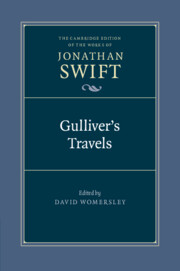Book contents
- Frontmatter
- Contents
- List of Illustrations
- General Editors’ Preface
- Acknowledgements
- Chronology of Swift’s Life
- Chronology of Gulliver’s Travels
- List of Abbreviations
- Introduction
- Gulliver’s Travels
- A Letter From Capt. Gulliver, to His Cousin Sympson
- The Publisher to the Reader
- The Contents
- Part I
- Part II
- Part III
- Part IV
- Long Notes
- Appendices
- Textual Introduction
- Select Bibliography
- Index
Introduction
Published online by Cambridge University Press: 02 September 2021
- Frontmatter
- Contents
- List of Illustrations
- General Editors’ Preface
- Acknowledgements
- Chronology of Swift’s Life
- Chronology of Gulliver’s Travels
- List of Abbreviations
- Introduction
- Gulliver’s Travels
- A Letter From Capt. Gulliver, to His Cousin Sympson
- The Publisher to the Reader
- The Contents
- Part I
- Part II
- Part III
- Part IV
- Long Notes
- Appendices
- Textual Introduction
- Select Bibliography
- Index
Summary
In 1946, George Orwell included Gulliver’sTravels in the six books he would wish to be preserved above all others. He did not specify the other five, and it is possible that, were we to know the other books he had in mind, it might take some of the edge off the compliment. However, as it stands it is a great and even Swiftian tribute. For Swift was no stranger to apocalyptic imaginings of the kind that Orwell here momentarily entertains. Indeed, he tended increasingly to contemplate them with relish rather than foreboding.
How did Gulliver's Travels become a candidate for such extreme honours? It is after all a book which to some extent draws sustenance from literary offal, the ‘abundance of Trash’ in the form of ‘Books ofHistory and Travells’ which Swift read during the summer of 1722. Swift knew, of course, that tulips could be raised from dung, and his imagination repeatedly placed before his judgement the idea of an inescapable, but necessary, immersion in what is most disgusting and deplored. As the hapless would-be panegyricist of ‘A Panegyric on Dean Swift’ complains:
Our Thoughts, to hit your nicer Taste,
Must in a diff’rent Mold be cast;
The Language Billingsgate excel,
The Sentiments resemble Hell.
Even in Swift's own day, there were those who shuddered at the allegedly hellish sentiments and vile language of particularly Part IV of Gulliver's Travels. Swift's imagination was increasingly drawn to parodic literary forms such as the paradoxical anthology or inverted florilegium: Polite Conversation (1738) and Directions to Servants (1745) are both examples of this. But in Gulliver's Travels, Swift offers us nothing less than a complete catalogue of themonstrosity of men. Expressly designed tomortify mankind's complacent definition of themselves as rational beings, Gulliver's Travels confronts the reader with varied images of human pettiness (Parts I and II), of ridiculous abstraction and intellectual pride (Part III), and finally of our general physical and moral repulsiveness (Part IV). Few other books contain so intense and vivid (albeit selective) an account of human nature. Perhaps in no other book is pitiless knowledge of that nature accompanied by so shrewd an awareness of the various ruses and stratagems we employ to disguise so unwelcome a truth from ourselves.
- Type
- Chapter
- Information
- Gulliver's Travels , pp. xli - civPublisher: Cambridge University PressPrint publication year: 2012

